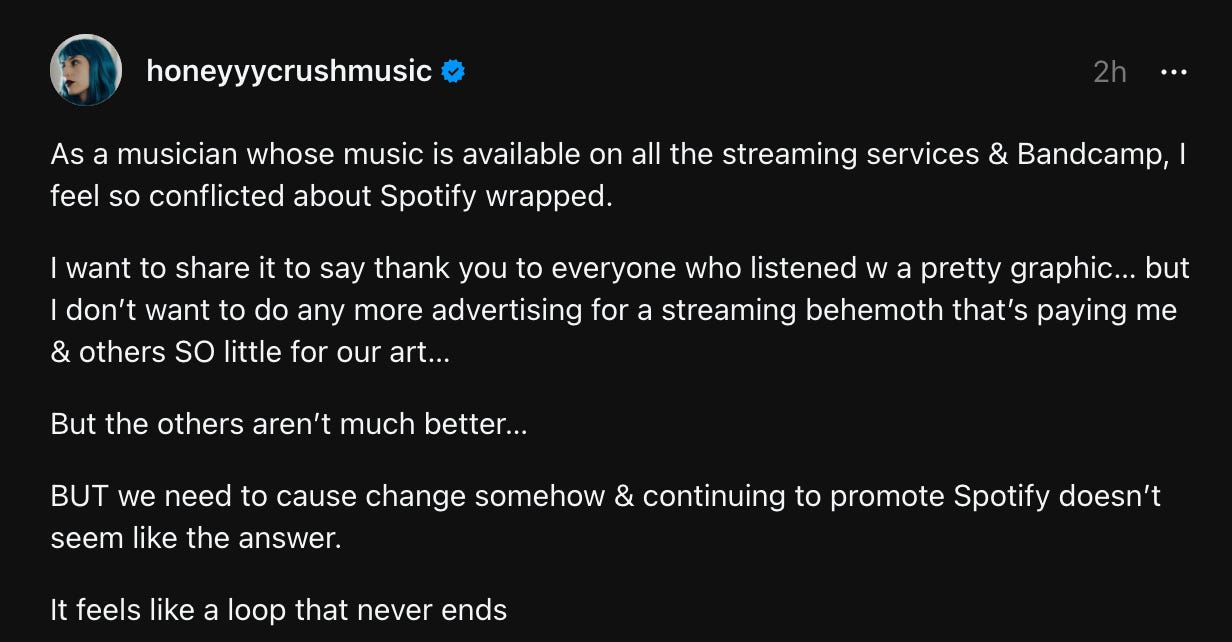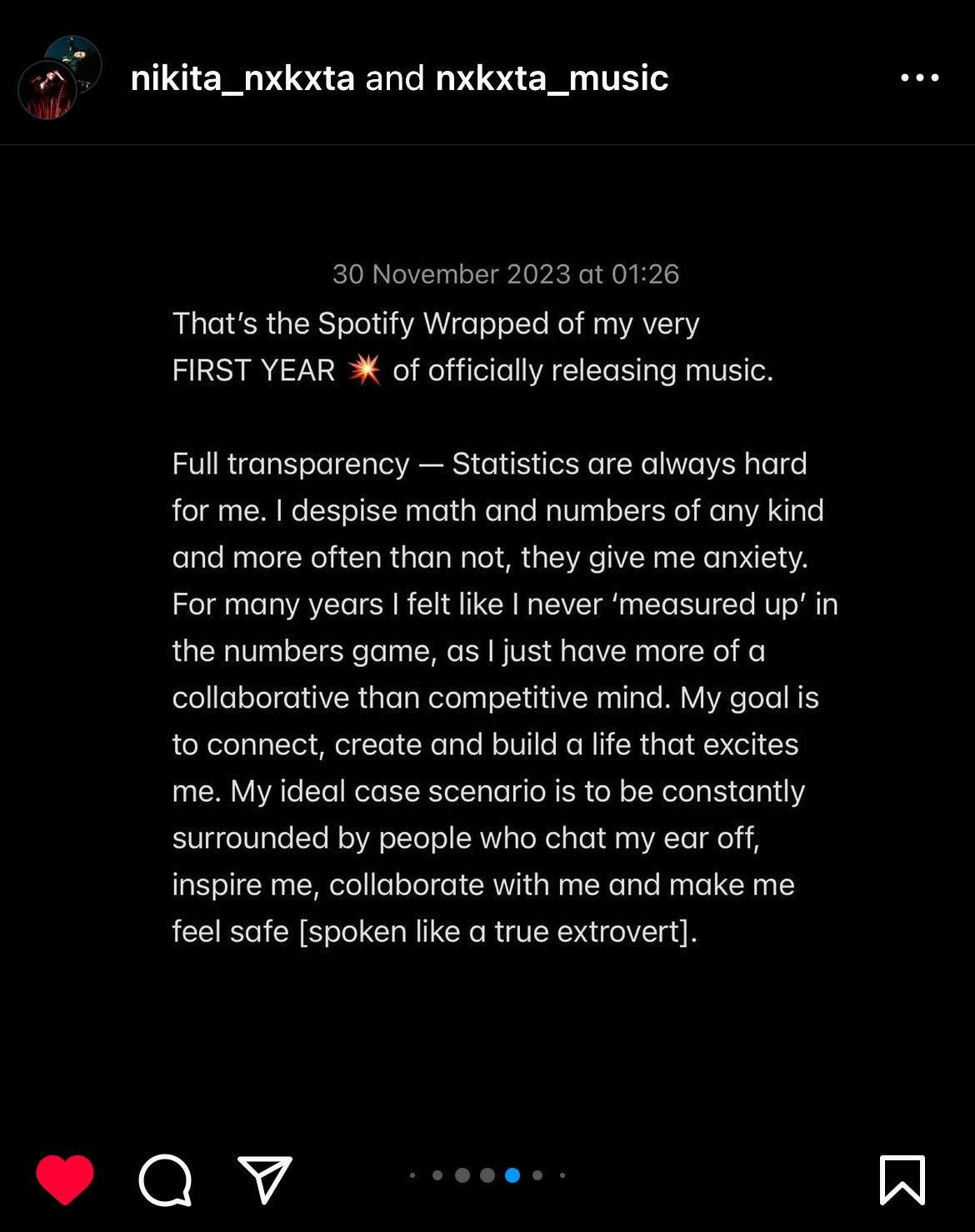Existential Crisis, Unwrapped
Why music fans should consider the artist at this "special time" of year, but don’t feel shame... it’s not your fault!

The annual data dump has begun. That’s what Spotify Wrapped feels like, right? A social feed full of big ketchup dollops of stats, rather than someone offering you an ice cream tub of love to share.
Of course, it’s a lovely marketing exercise for a service with 551 million users (far more than Apple Music’s reported 88 million but small compared to YouTube’s 2.1 billion!) and some ‘this is who I am’ self definition but amidst the information deluge there are a lot of contradictions for artists and fans alike.
Peel back the proud thank you posts from musicians, and you’ll find artists unsure about their place in the world, feeling conflicted about this annual moment. Many find the whole thing bleak because they make all-caps ART not measurable corporate content. For others, they’re both humbled by thousands of plays and dispirited it isn’t in the millions.
For every artist reaching an arena-sized audience across a year, there’s a musician caught in a comparison loop, oblivious to how much marketing money another act spent or whether they got lucky with the algorithm gods.
Meanwhile, other acts are perplexed, wondering why they can’t get more of these music fans into the same grassroots venue at the same time or to follow them elsewhere, maybe even engage with their Instagram post announcing their new track.
(Small aside but notably, unlike podcasts, there’s still no way to get notifications when an artist you follow on Spotify releases a new song or album. Whilst it may be good to stop notification overload, it could also be to help drive 45p per click for those adverts that pop up when an act/label promotes their new release, needing you to stream 200 times to get their money back)
These are just two of the gut-punch posts I noticed today (click the images to engage or follow them):


We live in the strangest of times.
Artists are reaching 1000s of fans but they rarely feel very connected to them. At scale, there are too many people to process. At the start and with half a foot on the ladder, some artists feel as if they’re waiting for the phone to ring or playing it (too) cool with those who turned up early to the party.
As fans we are discovering incredible artists but the acts aren’t getting much of our £120 a year subscription fee (or the equivalent value that advertisers feel our time listening to an ad is worth).
From the listener's perspective, the abundance of choice can lead to a paradoxical effect. While we have more music at our fingertips than ever before, the depth of our engagement often suffers. We're skimming the surface of a vast ocean of sound, rarely diving deep. This superficial engagement can lead to weaker artist-fan connections, a trend that's worrying for the long-term health of our music culture.
This disconnect isn’t why the internet was built and yet here we are, in little silos inside glass boxes. We can tell someone is on the other side of this black mirror glass, and like Dave Grohl in the ‘Walking After You’ video, we’re so near and yet so far.
As fans, we have the joy of abundance. We can listen to 10 recommended albums every week, new or old, in our comfort zone or far from it. We can hop and skip around, collate bits we like on playlists and hear 100s if not 1000s of songs every month in the all you can eat buffet of today’s infinite jukebox. And if you can’t find anything to listen to today, there will be around 120,000 new releases out tomorrow.
The economics of streaming make spending money to reach fans really hard and expensive for acts and labels too (yeah, I will keep bringing up the slot machine of giving your money to Meta and Google to reach you existing audience and new fans).
For instance, while an artist like Phoebe Bridgers or Stormzy might see substantial earnings, smaller artists often struggle to make ends meet. The average per-stream payout can range from $0.003 to $0.005, meaning thousands of streams are necessary just to earn the equivalent of a coffee. This economic model has raised serious questions about sustainability and fairness in the industry for a long time and sparked movements like the #BrokenRecord campaign and the UMAW in the USA.
Looking at your Spotify Wrapped, Apple’s equivalent or - if you’re old skool - your Last Fm annual scrobbles, you’ll likely see names of acts you’ve listened to a lot but have you told them that lately? Did you buy a bit of merch? Followed them on Bandcamp or BandsinTown? Or see if they have a Patreon? Or premium Substack? Have you checked out what else their label have released? Have you bought the record or a poster or some socks?
These are just some of the many small acts you can do right now or throughout the year to help deepen your connection with the music you love. Beyond following them on social media and telling a friend or everyone who follows you or an entire internet community how great their music is, you can even make direct donations to pay toward their next rehearsal or set of guitar strings.
I don’t mean to get all Robin Williams in Good Will Hunting but it’s not your fault your favourite artist isn’t earning minimum wage for the hours and years they put into their music that brightens, softens, enlivens, inspires, haunts or impacts you day in and day out in a myriad of other ways.
It’s not your fault that the economics of streaming mean that you’ve helped make Taylor Swift a billionaire (good for her!), Joe Rogan a multi-millionaire or paid for some heated seats in the Barcelona FC dugout.
It’s not your fault but that doesn’t mean you can’t take 5 minutes to write some random reminders in your calendar with ideas and actions, like ‘tell X band they’re great’ or see if ‘Y has new merch’ or just a note for January 2nd that says ‘consider how in 2024 you might help the artists you love and the music ecosystem’. You can write to your MP but given Spotify just pulled out of Uruguay after they brought in registration, I can understand why you might think twice.
TL;DR? As much fans, we’ve never had it so good but as music lovers are we just having shallow, drive-by relationships? Let 2024 be the year when your lists become a lust for change.
Related
- For more about streaming’s tangled economics, listen to episode 1 of the Drowned in Sound podcast with Musicians’ Union general secretary Naomi Pohl.
- Spotify to Pull Out of Uruguay (MusicAlly)
If the mere mention of Good Will Hunting tickled your Elliott Smith ducts, give this newsletter by BBC Wales’ Adam Walton a read.
